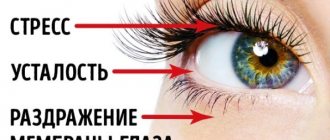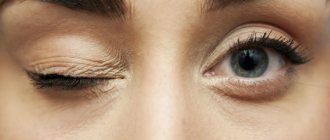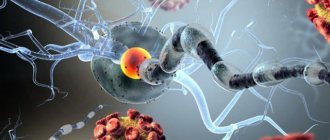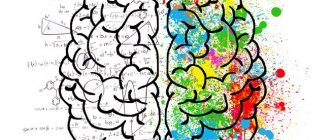Nervous tic - These are sudden, repetitive movements resulting from involuntary contraction of a specific muscle group. For example, it is often said that “the eye twitches.” Twitching can affect different muscles, spread from one muscle group to another, and even cover almost the entire body.
Movements during tics are obsessive and a person cannot control them. When you try to suppress a tic, the tension increases and as a result the tic only gets worse.
The most common tic occurs in childhood, and it is detected somewhat more often in boys than in girls. It is believed that tics occur in 13% of boys and 11% of girls.
Possible causes of the disease
Nervous tics are the result of increased brain activity, particularly in the extrapyramidal system. It serves to perform stereotypical movements, without involving the cerebral cortex. Excitement occurs and stereotypical movement appears.
By its nature, hyperkinesis is divided into:
- primary;
- secondary type.
In the first category, there is no relationship with any disease or trigger factors. Pathological conditions arise in childhood or adolescence, subsequently they can disappear and persist until adulthood. Disorders appear on their own, that is, without the presence of another clinical picture. For this variety, the factor of heredity plays a huge role.
The secondary type has a direct relationship with certain events or diseases. The occurrence of hyperkinesis can be provoked by:
- open and closed craniocerebral injuries;
- meningitis;
- cerebral blood flow disorders;
- taking certain medications (levopods, analgesics from the narcotic spectrum, central nervous system stimulants);
- psychiatric disorders;
- neuralgic ailments;
- frequent intoxication of the body;
- neurodegenerative disease.
These pathologies are accompanied by other factors. To relieve the clinical picture, it is necessary to treat the primary disease, get rid of the consequences of taking medications, and injuries.
How does this happen?
Due to vigorous activity near computers or phones, books, which requires the work of the facial muscles of the eyes, forehead and face as a whole, the eyes become very tired. This happens to such an extent that the neurotransmitters responsible for muscle function cease to be synthesized correctly. That is, chemicals do not transmit impulses from neurons to muscle tissue. The eyelid begins to twitch. Disruption of neurotransmitters is associated with stress and fatigue, and people often notice this. If the day turns out to be unpleasant, then the eye will definitely begin to twitch. Myokymia can be caused by some antipsychotics and nervous system stimulants in combination with difficult life events.
Childhood disorders
Hyperkinesis occurs in various forms in 3 out of 10 children. In most cases, tension in a child's muscle groups occurs between the ages of two and ten years. Representatives of medicine also encounter such diseases at older ages. An experienced neurologist can safely say that involuntary contractions of muscle tissue occur three times more often in boys than in girls.
Most often, it is necessary to treat a nervous tic when entering school or kindergarten. Such moments in life leave a negative imprint on the stable functioning of the central nervous system. In these situations, you may notice involuntary twitching of the baby's eyelids. For nervous eye tics in childhood, special therapeutic programs are not needed, since very often the disease goes away on its own. If this does not happen as you grow older, it is necessary to diagnose and get rid of the problem medically.
Usually children do not notice any violations, even if they pay attention to it. They cannot prevent pathology, and with regular attempts their frequency may increase, as in adults, hyperkinesis can be primary and secondary. The first option is a dysfunction of the central nervous system, the second is diseases associated with the central nervous system.
Causes of muscle twitching include:
- emotional trauma. This could be stress, physical or psychological abuse, difficulties in the family, school or kindergarten. Much depends on the character and temperament of the baby. For example, there are children who demonstrate their emotions, but others find it difficult to express their own fear, negative impressions, and inner thoughts. Then they accumulate and transform into such a clinical picture;
- constant overwork. Schoolchildren experience severe mental and physical stress. To independently eliminate the consequences, you need to play sports, active games, and quiet walks. The accumulation and excess of emotions lead to the fact that the nervous system cannot stand it, therefore a tic of the eye or other parts of the body appears;
- genetics. The hereditary possibility of developing the disease should never be rejected. If mom or dad suffered from it at any age, the chance of an identical disease in a child is 1 in 2.
Psychologists believe that the method of education can also become the root cause of pathology. For this reason, excessive categoricalness, prohibitions and punishments, without warm family relationships, are not recommended. It’s the same with hyper-custody, eternal control and interrogations about every action of the child.
Parents are not able to protect their offspring from all adversities, but at the same time they guarantee him emotional failure. The psycho-emotional reason for children's twitching of the eyes, hands, and neck can be put in first place.
Provoking factors may also include health problems, for example, serious illnesses. Very often, muscle movements are caused by the fact that the body has recently been exposed to diseases such as meningitis, atherosclerosis, encephalitis, or head trauma.
When should you see a doctor if you have a tic?
Every person can experience involuntary muscle contractions under great emotional stress (for example, eyelid twitching). If such manifestations are observed within 2 weeks (including repeated single tics), then this is already a disease. Tics that last less than a year are called transient (temporary). If a tic persists for more than a year, it is called chronic. Simple transient tics usually go away on their own. However, it is still necessary to see a doctor to reduce the risk of the tic becoming stronger and stronger.
Features of pathology diagnosis
If at least one sign of hyperkinesis is observed, you should immediately seek help from neurologists and psychiatrists. Consultation can be obtained at our center; we pay attention to every symptom and offer an effective solution to the problem. To make a correct diagnosis, our specialists prescribe a comprehensive diagnosis, which consists of:
- initial collection of anamnesis. Thus, the doctor establishes the period and circumstances when hyperkinesis occurs. Its nature, location, and duration must be determined. It is very important to take a medical card with you to your appointment to study current and past illnesses;
- neurological examination of patients;
- prescribing biochemical and clinical blood tests;
- conducting instrumental research. Depending on the person’s well-being, the doctor may prescribe an EEG, skull x-ray, CT or MRI;
- appointment of additional consultations with specialized specialists (traumatologist, psychiatrist, oncologist).
When carrying out procedures, specialists separate pathology from the patient’s habits, which arise involuntarily at the time of an emotional state. Also, doctors must establish and treat the factor that caused the nervous tic.
Tourette's syndrome
Tourette's syndrome occupies a special place among nervous tics in adults. This is the most severe form of hyperkinesis of all possible. It affects certain areas of the brain, leads to disability and isolation of the patient from society, and can manifest itself with the following symptoms or combinations thereof:
- contraction of the muscles of the face and neck;
- twitching of limbs;
- shrug;
- erratic movements, turning the head or body;
- snapping fingers.
Motor tics are almost always accompanied by vocal ones. This may include coughing, repeated repetition of sounds or individual words, or involuntary shouting of curses.
Tourette's syndrome is usually characterized by a combination of complex motor and vocal tics accompanied by a general disturbance of mental status. The disease significantly worsens the quality of life of its owner. A person cannot visit public places or, for example, choose a profession that requires close contact with the team.
Hereditary factors play a key role in the development of Tourette syndrome. Moreover, it is not at all necessary that the parents also have the same complex tic disorders. It is enough that someone in the family had a nervous tic in childhood. Even if it subsequently disappeared without a trace, the risk of severe consequences in future generations in the form of TS increases many times over.
Varieties
During the diagnostic process, doctors determine the type of disease. Not all facial pathologies are dangerous for humans and can bring discomfort into everyday life. If they do not interfere with people and do not have negative consequences, they generally do not need treatment for nervous tics. But in any case, it is necessary to conduct an examination to determine the root causes of their occurrence.
The most common types are:
- simple. These include blinking, twitching of the head or limbs (involuntary tremors), winking, clenching hands into fists;
- complex. This category includes turning while walking, jumping, snapping fingers, and other actions.
The voiced options refer to motor nervous tics. But there are also others, for example, vocal pathological conditions include smacking, pronouncing certain words and phrases, and grunting.
There is hyperkinesis, which interferes with life. It occurs with complications and does not allow the patient to feel like a full-fledged member of society. Such diseases and symptoms must be corrected. Getting rid of a problem on your own very often does not lead to anything good.
Prevention and treatment
Knowing the reasons, it will be easier to cope with a twitching eyelid and prevent the situation from worsening. Here are some simple options:
- give the body the right amount of time to rest and recover, organize sleep correctly,
- drink less caffeinated drinks, it is better to replace them with water,
- try not to create or enter into stressful situations, but treat everything calmly and judiciously,
- do gymnastics for the eyes,
- give your eyes a rest between activities,
- do not drink alcohol,
- properly organize the workplace, adjust the light and ventilate the room.
treatment of myokymia
In some cases, these simple steps will be enough to get rid of the problem. But if this does not bring any results, you need to consult a doctor. Together with him, undergo examinations of the nervous system, vision, and internal organs, after which he will select the appropriate treatment (medicines, lifestyle adjustments, lenses, glasses). You should contact a specialist in any case, as self-medication can worsen the situation.
Treatment of nervous tics
A nervous tic of the neck and its treatment cannot be carried out without determining the reasons that led to it. Therapy of primary varieties is carried out in a course without or with drugs. It all depends on where the defeat occurred and its complexity. The use of medications is acceptable if a person requires quick relief of symptoms. The drug allows you to reduce twitching to a minimum or completely eliminate it.
At our clinic in Moscow we use a multi-drug program. The therapeutic course may include any of the following:
- muscle relaxants;
- neuroleptics;
- sedative and sedative;
- nootropics;
- antidepressants;
- anticonvulsants.
To achieve this goal, the doctor adjusts the dosage and composition of the drugs. An equally important process on the path to recovery is massage of the face, hand or other area of the human body, acupuncture. Psychotherapy can achieve muscle relaxation, acceptance and release of negative emotions. The strongest method for treating nervous tics is a combination of several directions at once.
Chronic pathologies simply do not go away without medication. Very often, doctors prescribe botulinum toxin injections as the main medicine. Such injections are aimed at muscle tissue that is directly involved in stereotypic movement. Achieving a healthy result has a short-term effect. The effect of the drug lasts from four to six months. It is able to immobilize the muscle for a specified period, which leads to the elimination of the disorder.
A combination of a medication program and physiotherapy demonstrates excellent results. Very often, tonic baths, paraffin baths, electrophoresis of the cervical-collar area with certain agents, and underwater massages are used.
Self-treatment is a difficult way to relieve symptoms of the disorder. It will take you many years, and at the same time does not guarantee the desired result. Most often, this decision leads to even more negative manifestations, especially if the root cause is illness or injury.
Prevention of the appearance of the clinical picture
Maintaining an optimal sleep and wakefulness regime, maintaining physical parameters at a level, giving up bad habits, minimizing stressful moments, overwork. All these factors play an active role in healing and preventing the manifestation of muscle twitching.
The lifestyle prescribed by the treating neurologist should be observed as much as possible. Patients need to reduce the time they use computers, reduce the amount of energy drinks, caffeine, alcoholic beverages, and give up drugs and strong medications.
If recommendations are not followed, they can become psychogenic factors in the re-development of the disease. A stable psychological state, walks in the fresh air, and lack of stress are the “building blocks” of a relaxing course and strengthening of overall health. Therefore, it is extremely important to adhere to a healthy lifestyle without bad habits, but with proper organization of working time and rest.
Very often, psychotherapists and neurologists prescribe homeopathy, sedatives, antispasmodics, sedatives and immunostimulants. Such drugs will definitely need to be taken in the dosage prescribed by a specialist.
One responsibility of a former patient is to promptly seek medical help for traumatic brain injuries, infectious diseases and other dangerous illnesses. This should be taken seriously, because such negative factors can reactivate symptoms and aggravate them.
Why should you trust our hospital?
Many people are interested in the question of how to choose a doctor and clinic to get rid of this unpleasant disease. Of course, this problem requires immediate treatment. With the help of a properly designed course, the recovery process will go quickly. Every person has the right to receive the most effective therapy, taking into account the body.
You should not enter “treated...” into the search bar, look for who does massage in honey, or read many articles about traditional methods of healing. In our work, we use new proprietary therapeutic programs and guarantee your recovery.
For each person, a personal comprehensive treatment regimen is developed. We take into account the degree of complexity, stage of development of the disease, general health, the presence of contraindications and allergic reactions.
Our doctors normalize metabolic processes, optimize the functioning of the central nervous system, and correct psychiatric disorders. You can find out about the results, methods used and other information by phone. The path to treatment is close, just go to our website, find out the phone number and get comprehensive advice on all issues.
Advantages
The strengths of our neurological center are:
- the doctors. Who will do everything to heal adults and children. They constantly improve their knowledge and skills, undergo training and internships in leading clinics in the country and abroad;
- accurate, advanced diagnostic technologies. We determine the root cause using innovative devices, for example, EEG, CT, ENMG, MRI. Our laboratories are equipped with modern instruments that provide reliable results, and errors are reduced to zero;
- complex therapy using original methods. We offer a combination of medications, psychological and physiological methods for hyperkinesis. This approach will allow you to achieve your goal and secure it for a longer time.
Have you or your loved ones experienced hyperkinesis? Come to us, and after a while you will forget about the unpleasant twitching of your eyelids, hands or other parts of the body. You deserve better!









